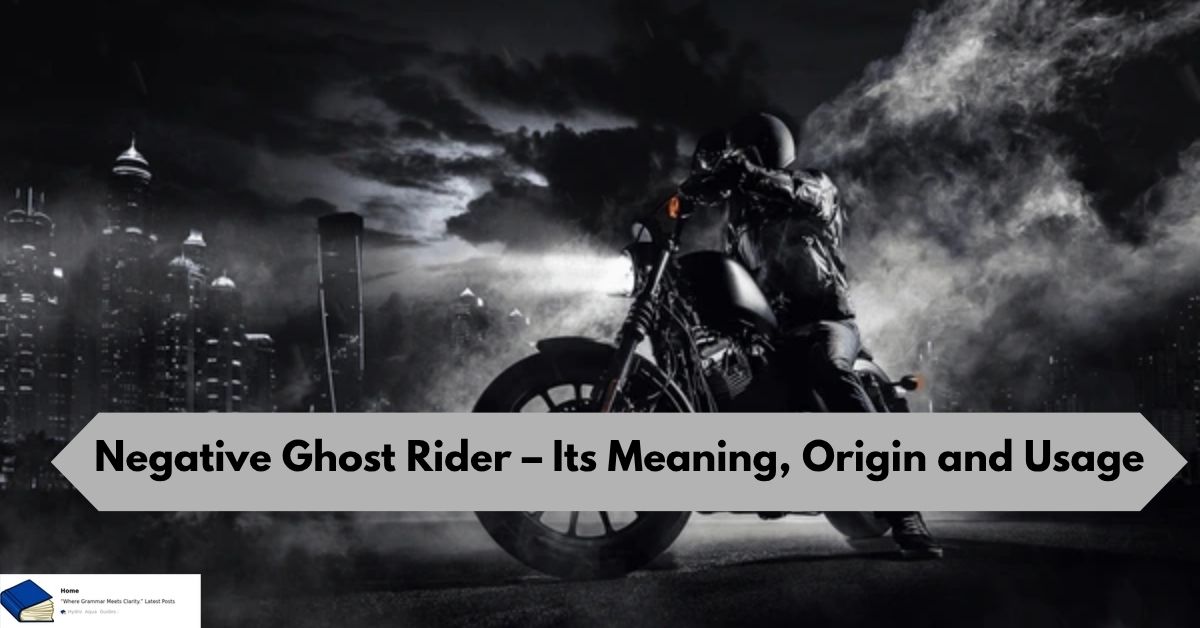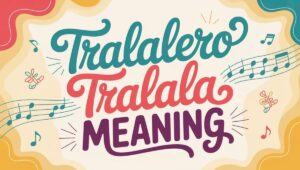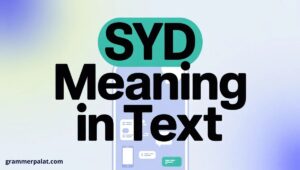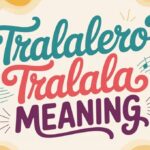Ever been turned down in a way so smooth, it actually made you smile? That’s where “Negative, Ghost Rider” comes in a classic rejection phrase that’s become a favorite in everything from movies and memes to casual conversations. But what does negative ghost rider mean, really? Where did it come from, and how did it evolve from a military line into a funny way to say no?
In this article, we’ll break down the negative ghost rider meaning, trace its origin, show you how to use it, and explore its pop culture legacy, especially in connection to the Top Gun movie quote that made it legendary.
The Meaning of “Negative Ghost Rider”
Let’s get straight to it: what does negative ghost rider mean?
At its core, “Negative, Ghost Rider” is a clever way to say “no” but with style.
It’s typically used as a humorous or playful rejection, often to lighten the mood. Instead of flat-out saying “Nope,” someone might drop a confident, “That’s a negative, Ghost Rider,” making the denial sound both cooler and more memorable.
🔹 Definition Breakdown:
- Negative = Military lingo for “no”
- Ghost Rider = Call sign (aviator nickname) used in the movie Top Gun
Put together, negative ghost rider is basically a cinematic, radio-style “no,” that’s gained popularity far beyond the cockpit.
What Is Negative Ghost Rider From?
If you’ve heard someone say this and thought, “Wait, what is negative ghost rider from?” you’re not alone.
This now-iconic phrase originated from the 1986 blockbuster film Top Gun. During a scene early in the movie, Maverick (Tom Cruise) and Goose request a flyby from the control tower. The response from the air traffic controller?
“Negative, Ghost Rider, the pattern is full.”
Boom. Instant legend.
That brief radio transmission became one of the most quotable lines in the film and was quickly adopted by fans who appreciated both the delivery and the attitude.
The Origin of the Phrase: From Fighter Jets to Everyday Speech
The origin of the phrase lies firmly in military aviation. In real-life U.S. Navy and Air Force communications, pilots use call signs and respond with short phrases like “affirmative” or “negative.” It’s all about efficiency and clarity in high-pressure situations.
In Top Gun, “Ghost Rider” was the call sign used by Maverick’s flight team. So, when the control tower says, “Negative, Ghost Rider,” it’s just standard military radio speak.
But Hollywood magic gave it new life. Audiences latched onto the phrase for its:
- Unique rhythm
- Cool tone
- Perfect blend of authority and sarcasm
And just like that, a new cultural idiom was born.
Negative Ghost Rider Meaning in Today’s Language
So, how do people use negative ghost rider today? It’s no longer just pilot talk it’s pop culture shorthand for turning someone down in a funny, friendly way.
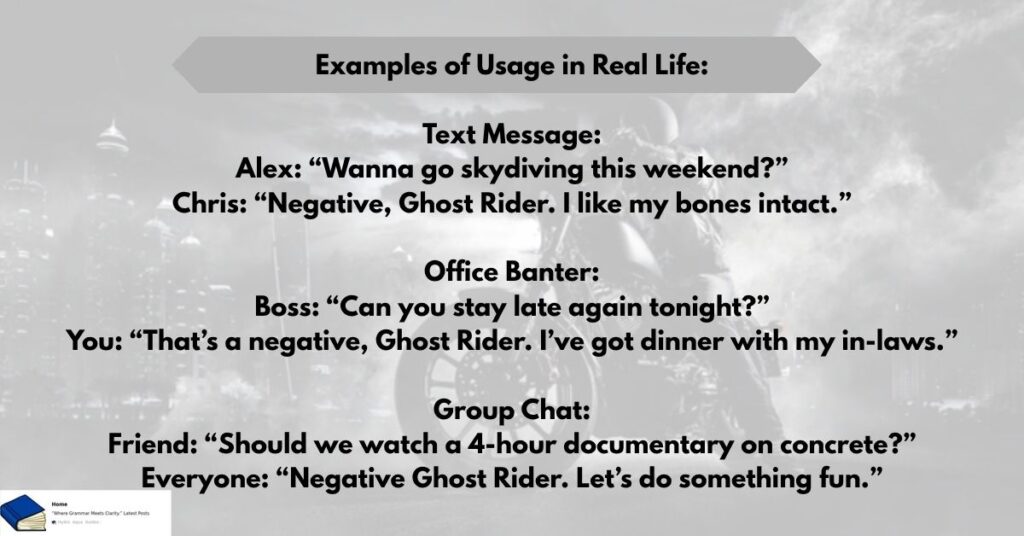
As you can see, it fits perfectly when you want to reject something without being rude.
Why It Stuck: Pop Culture and Playfulness
Top Gun’s Legacy
The Top Gun 1986 film introduced audiences to aviation lingo and military communication phrases that felt fresh, exciting, and oddly relatable.
“Negative, Ghost Rider” stuck out because it:
- Sounded different than just “no”
- Had a built-in sense of authority
- Came from a character everyone admired
Funny Ways to Say No
Let’s be honest saying no can be awkward. But drop a “negative ghost rider” and suddenly you’re:
- Not rude
- Still firm
- A little bit cool
It’s now among the best-known rejection phrases from movies, up there with “I’ll be back” and “You can’t handle the truth!”
Common Mishearings: “Negative Ghostwriter”?
One amusing twist? Some people mishear or misremember the phrase as “negative ghostwriter.”
That’s right negative ghostwriter is a common misinterpretation, especially by those unfamiliar with Top Gun slang or aviation culture. But while a ghostwriter might quietly pen someone else’s book, it has absolutely nothing to do with military radio responses.
So if you see someone write “That’s a negative ghostwriter” online, now you know—they probably just didn’t grow up watching Top Gun.
How to Use “Negative Ghost Rider” in Conversation
Want to start using the phrase yourself? Here are a few fun and clever ways to integrate it naturally into your daily vocabulary.
Casual Situations:
- “Hey, want to join a 6 AM yoga class?”
“Negative, Ghost Rider. My bed wins.” - “Can I borrow your PS5 for the weekend?”
“That’s a negative, Ghost Rider. Nice try though.”
Polite Professional Settings (with Humor):
- “Can we squeeze another project into this week?”
“Negative, Ghost Rider. That runway’s full.” - “You free to cover my shift?”
“Unfortunately, negative Ghost Rider. I’m already booked.”
Just remember: Tone matters. Use it with people who will appreciate the joke don’t throw it at your boss mid-meeting unless they’ve got a sense of humor.
Modern Variations and Memes
Thanks to social media, the phrase has experienced a massive revival. You’ll see it used:
- As memes on Twitter and Reddit
- In TikTok skits with audio from Top Gun
- As a GIF or reaction image for any kind of friendly “nope”
Some users even stylize it with flair:
- “That’s a NEGATIVE, Ghost Rider.”
- “NGR – Not Gonna Respond.”
Whether serious or ironic, it’s a great example of how movie quotes in conversation can evolve into living language.
Other Funny Rejection Phrases You Might Like
If you love “Negative, Ghost Rider,” here are some other fun alternatives to saying no that carry similar charm:
| Phrase | Context |
|---|---|
| “Hard pass.” | Casual, humorous rejection |
| “Not in this lifetime.” | Dramatic or sarcastic “no” |
| “My schedule says no.” | Work or time-based excuse |
| “That’s gonna be a no from me, dawg.” | Pop-culture line from American Idol |
| “Respectfully, no.” | When you want to sound firm but polite |
| “I’m allergic to that kind of stress.” | Playful refusal for big tasks |
Adding variety keeps your communication fresh and adds some personality.
Why Phrases Like This Matter
Language isn’t just about grammar and vocabulary. It’s about expression, connection, and sometimes, entertainment. The reason phrases like “negative ghost rider” endure is because they offer:
- Emotion (you feel something when you hear it)
- Character (it adds flair to otherwise boring responses)
- Community (when you know, you know it’s a Top Gun thing)
It also taps into a deeper trend: using humor and pop culture references to soften rejection. Whether it’s declining an invite or rejecting a bad idea, doing it with a wink and a quote feels more human.
Closing Thoughts: Why “Negative Ghost Rider” Still Soars
From fighter jets to Facebook, from military airspace to office memes, negative ghost rider has come a long way.
Its combination of:
- Military precision
- Cinematic style
- And humorous delivery
has made it a favorite for generations of movie lovers, meme makers, and casual conversationalists alike.
So the next time someone offers you something outrageous skydiving in the rain, pulling an all-nighter, or binge-watching a concrete documentary you know what to say.
“That’s a negative, Ghost Rider.”
Quick Recap Table
| Question | Quick Answer |
|---|---|
| What does negative ghost rider mean? | A funny or stylish way to say “no” |
| What is negative ghost rider from? | The 1986 film Top Gun |
| Why do people say “negative ghostwriter”? | It’s a common mishearing of the original phrase |
| How to use it? | Use it as a humorous rejection or denial |
| Is it still popular? | Yes, especially in memes, GIFs, and casual slang |
| Is it literal? | No, it’s figurative and rooted in pop culture |
Conclusion
Using “Negative, Ghost Rider” in the right moment is like giving your “no” a personality. It’s witty, nostalgic, and endlessly quotable.
And who knows? The next time you drop the line, someone nearby might smile and respond with, “Talk to me, Goose.”
Because in the world of language, sometimes a single line from a movie can fly higher than the rest.
